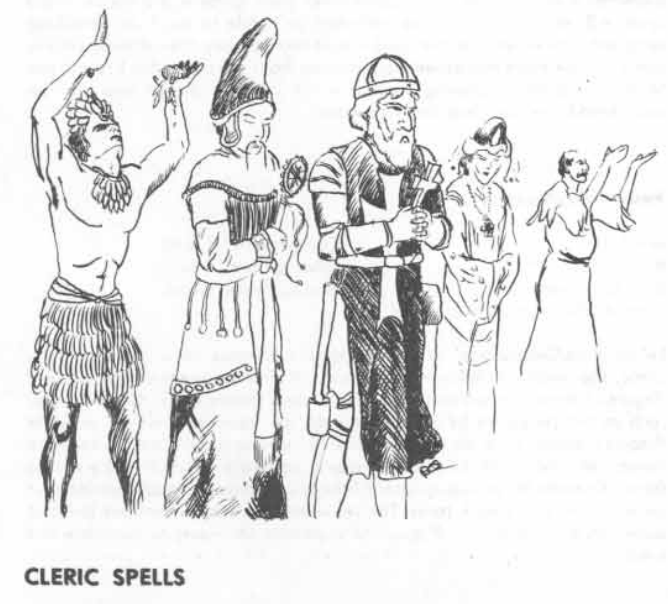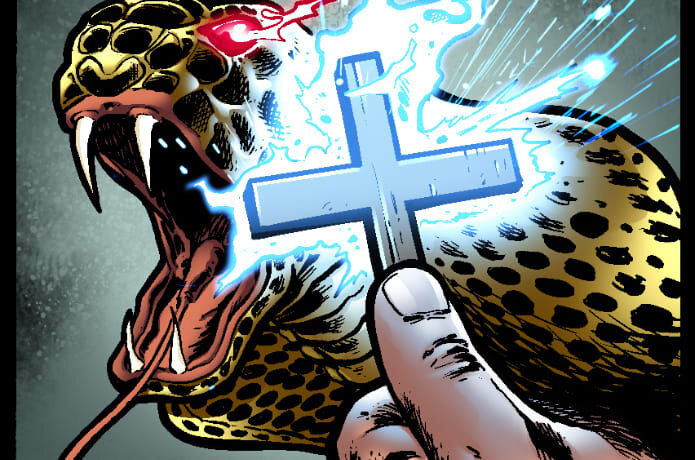Clerics in Fantastic Literature

An attempt at ecumenism for clerics in the AD&D Players Handbook
Last evening after work, I was delving into the Grognardia blog, and I found this post on The Implicit Christianity of Early Gaming from 2008. James Maliszewski makes this startling [to me] claim right at the beginning:
One of the many interesting ways that Dungeons & Dragons differs from its literary forebears is in the matter of religion. Pulp fantasy, by and large, is unconcerned with the subject. Priests are generally portrayed as hypocrites at best and outright villains at worst. Likewise, the actions of the gods, if they occur at all, are mysterious and easily written off by the skeptical as mere chance. This clearly isn't the case in D&D, where, thanks to the inclusion of the cleric, religion has always played a role in the game.
My own reading in Appendix N and the pulps has come to the opposite conclusion: I find the pulps startlingly Christian and very much concerned with religion. I did a quick check on Maliszewski’s choice of term “pulp fantasy”, and yes, he is using the term in about the same sense I mean it: pre-Campbelline adventure fiction.
However, it is a little harder to understand the cleric as a class in D&D because there isn’t an obvious and well-known character of this type in the works in Appendix N. I think you can make a good argument that you can find one, but Brother Parvus doesn’t have the same name recognition as John Carter or Fafhrd and the Grey Mouser.
So that got me to wondering, what other literary examples of clerics can be found in adventure fiction of a fantastic bent? As this comment on the Implicit Christianity of of Early Gaming shows, clearly I have a very different impression than commenter Delta of the state of the literature:
….
The one thing I can see in OD&D is the assumption of a medieval European Crusading priest (Vol. 1), who happens to delve into areas with a lot of surviving lost Classical Greek monsters (Vol. 2). But that's not like any of the published D&D campaign settings, nor any fantasy world I can think of, so for me the D&D cleric really has to go.
There is a lot of interesting detail in this Grognardia post and its comments, as well as in the linked post Medic! that explains that Dave Arneson was the creator of the cleric class, and that Arneson used Abraham Van Helsing as his inspiration for a character that would serve as a foil to a vampire PC in his Blackmoor campaign.

The power of Christ compels you!
However, Bram Stoker isn’t listed in Appendix N since he was Dave’s inspiration, not Gary’s. So what else? I have to admit that Appendix N is a little light on this particular class archetype in my own reading. I can think of a number of recent examples of this kind of character, such as Father Retter in the Soulfinder comic or Forgotten Ruin’s Chief Rapp or the Marcellusite order in R. A. Williamson’s Widow’s Son [Amazon link]. However, these are all clearly cases of D&D influencing stories rather than the other way round.
My best guess is that the Van Helsing type characters were more prominent in movies in the mid-twentieth century, especially in the Hammer Films oeuvre. I suspect you could find some pre-1975 adventure fiction examples too, but the impression of Maliszewski and commenter Delta may be more accurate than it first seemed to me.
This is pretty speculative on my part, but I do wonder whether the clear anti-religious bias of Campbelline-era science fiction, especially the Futurians, bled over into the rest of adventure fiction. I do think it is hard to understand the way stories are told has changed over time if you put up too many barriers between science fiction and fantasy, which are both really just the kind of stories that feature fantastical adventures.
Comments ()